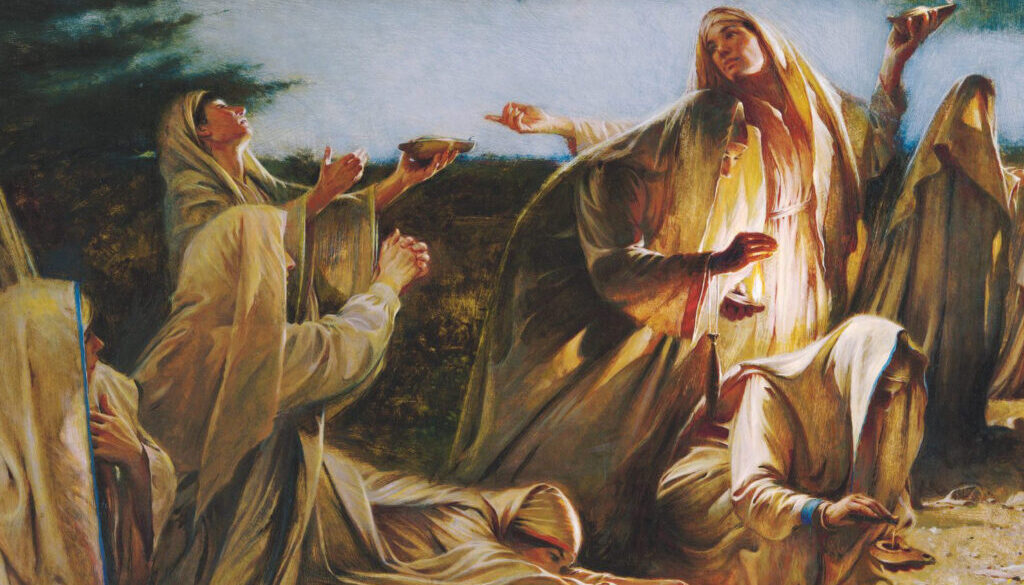Preparation for the Second Coming – Consecration
This morning, I had the opportunity to share a message with a congregation about preparing for the Second Coming of Jesus Christ.
In Matthew 25, Jesus teaches the parable of the ten virgins. In the story, ten virgins took their lamps and went out to meet the bridegroom. Five of them were described as wise, and five as foolish. All ten had lamps, but only the wise brought extra oil in preparation for a possible delay.
As time passed and the bridegroom delayed his coming, all ten of the women grew weary and fell asleep. Then, at midnight, the call came, “Behold, the bridegroom cometh; go ye out to meet him” The virgins rose and trimmed their lamps, but only those who had brought extra oil were able to keep their lamps burning. The foolish, having run out of oil, hurried off in search of more. But while they were gone, the bridegroom arrived.The prepared virgins entered into the marriage feast, and the door was shut. When the others returned and pleaded to be let in, they found that it was too late.
At first glance, we might think this is a parable about being prepared. And it is. But it’s also about what kind of preparation matters most.
All ten virgins had lamps. This means they all looked the part. They were all invited and all had light burning from their lamps, they likely even used each other’s fire to bring a flame to their own lamp. But when the bridegroom delayed, what separated the wise from the foolish wasn’t their lamps, but their oil.
The Doctrine and Covenants deepens our understanding of the parable of the ten virgins by identifying the oil as the Holy Ghost. It states, “For they that are wise and have received the truth, and have taken the Holy Spirit for their guide, and have not been deceived—verily I say unto you, they shall not be hewn down and cast into the fire, but shall abide the day.”
As we strive to be worthy of the constant companionship of the Holy Ghost, we are, in effect, adding oil to our lamps one drop at a time. This spiritual oil is accumulated in quiet sincere morning prayers, in daily choices to act with integrity, in moments of extending forgiveness to others and ourselves, in loving through selfless service, in learning to trust God and His, and in diligently studying and applying the word of God, as revealed in scripture and through living prophets.
All of these small actions might seem insignificant on their own, but together they create a steady reservoir of oil.
Each drop is not a one-time event, but a daily offering. An accumulation of choices, sacrifices, and quiet acts of devotion. It is all the small, consistent efforts that keep our testimonies burning brightly, even in the darkest of nights. A source of light, peace, and guidance that will help us endure and ultimately “abide the day.”
This kind of steady discipleship is illustrated by the Nephites in the Book of Mormon, We read:
Nevertheless they did fast and pray oft, and did wax stronger and stronger in their humility, and firmer and firmer in the faith of Christ, unto the filling their souls with joy… even to the purifying and the sanctification of their hearts, which sanctification cometh because of their yielding their hearts unto God.
Unlike dramatic conversion stories such as Alma the Younger, their oil did not come from suddens, miraculous moments. Instead, it was gathered drop by drop through daily spiritual habits.
As a result of their consecrated efforts, “many blessings were poured out upon the people, that even the high priests and teachers were themselves astonished beyond measure.
And it came to pass that the work of the Lord did prosper unto the baptizing and uniting the church of God, many souls, even tens of thousands.
Thus we see that the Lord is merciful unto all who will, in sincerity of their hearts, call upon his holy name.
Yes, thus we see that the gate of heaven is open unto all, even those who will believe on the name of Jesus Christ, who is the Son of God.
To have our lamps filled in preparation for the coming of the Savior, our lives must begin to reflect the life the Savior would have us live. This means more than checking boxes or going through the motions. It means offering our hearts fully and sincerely to Him
In the most recent General Conference, Elder Renlund shared a story that speaks powerfully to this idea. He told of a teacher named Zusya, who began to tremble as he approached death. His disciples asked, “Master, why do you fear? You’ve lived a righteous life. Surely God will reward you.”
Zusya replied, “If God asks me, ‘Zusya, why were you not another Moses?’ I will say, ‘Because You didn’t give me the greatness of soul You gave Moses.’ And if He says, ‘Why were you not another Solomon?’ I will say, ‘Because You didn’t give me Solomon’s wisdom.’ But what will I say if God asks, ‘Zusya, why were you not Zusya? Why were you not the man I gave you the capacity to be?’ That is why I tremble.”
This story reminds us that the Lord is not asking us to be someone else. He isn’t measuring us against prophets, leaders, or those around us. He is asking us to become the version of ourselves that He created us to be. He is not merely asking for our presence in the chapel each Sunday—He is asking for our hearts. And not just any hearts—consecrated hearts.
Too often we reduce consecration to the idea of communal sharing or temporal sacrifice, forgetting its deeper spiritual meaning: to make something sacred or holy. Elder Neal A. Maxwell taught, “Ultimate consecration is the yielding up of oneself to God. Heart, soul, and mind.”
Consecrated hearts are willing hearts. Willing to follow. Willing to trust. Willing to give Him our time, our efforts, our talents, our devotion. When we do, our lamps begin to fill. Drop by drop, day by day, we become more prepared, not just for His coming, but to become the disciples He has always known we could be.
“For how knoweth a man the master whom he has not served, and who is a stranger unto him, and is far from the thoughts and intents of his heart?” When we offer these things with sincere intent, He sanctifies them. He fills our lamp with those blessed drops of oil supplying light we could never create on our own.
There’s a story about a chicken and a pig hanging around the barn and they found themselves discussing their contributions to the farmer’s breakfast table. The hen bemoaned always having to donate her eggs for breakfast each day. The pig responded thoughtfully, “Yes, but for you, it’s just a small sacrifice. For me, it’s a total commitment!”
Elder Neal A. Maxwell has said:
“In pondering and pursuing consecration, understandably we tremble inwardly at what may be required. Yet the Lord has said consolingly, “My grace is sufficient for you”. Do we really believe Him? He has also promised to make weak things strong. Are we really willing to submit to that process? Yet if we desire fulness, we cannot hold back part!
Having our wills increasingly swallowed up by the will of the Father actually means an enhanced individuality, stretched and more capable of receiving “all that [God] hath”. Besides, how could we be entrusted with His “all” until our wills are much more like His? Nor could His “all” be fully appreciated by the partially committed.”
If there is one thing President Nelson has repeatedly admonished in recent years, it is that we must be preparing ourselves to see the Savior.
What does it mean to be prepared for the Second Coming?
Like the rich young man, we can check our spiritual thermometer by pondering the question, “ what lack I yet?” Is it about watching for the signs, or is it something much more meaningful like becoming someone like the five wise virgins prepared to meet the bridegroom with our lamps trimmed and filled with a reservoir of oil gathered drop by drop in faithful consecrated discipleship.
Elder Neal A. Maxwell stated,
“Only by aligning our wills with God’s is full happiness to be found. Anything less results in a lesser portion. The Lord will work with us even if, at first, we “can no more than desire” but are willing to “give place for a portion of [His] words”. A small foothold is all He needs! But we must desire and provide it.
So many of us are kept from eventual consecration because we mistakenly think that, somehow, by letting our will be swallowed up in the will of God, we lose our individuality. What we are really worried about, of course, is not giving up self, but selfish things—like our roles, our time, our preeminence, and our possessions. No wonder we are instructed by the Savior to lose ourselves. He is only asking us to lose the old self in order to find the new self. It is not a question of one’s losing identity but of finding his true identity!”
You know I had never consider the possibility of losing my hair. A beautician once told me that because of how thick it was, I’d probably go gray before ever I lost it. So I didn’t think twice—until one day I happened to notice in a photo that it was thinning. That was the first time it became an area of concern.
But did that change my identity as a “hair grower”? Certainly not. I just started growing it in new, more creative places—like my ears and nose.
Did that change my identity as a father? As a husband? As a member of my church or community?
And most importantly—did it change my identity as a child of God?
I simply joined the ranks of the Elder Eyrings of the world.
Brothers and sisters, the parable of the ten virgins is not just a warning—it is an invitation. It is a call to prepare not just by doing, but by becoming. To live not just with a lamp in hand, but with a reservoir of oil deep within our souls—oil that cannot be borrowed, bought last minute, or faked. It must be gathered personally, quietly, and consistently.
The wise virgins were not perfect. But they were faithful. They understood that spiritual preparation is not a one-time event—it is a way of life. It is not about appearing righteous, but becoming holy. And that kind of preparation—the kind that fills our lamps and sanctifies our hearts—comes from consecrating our lives to the Savior, one drop at a time.
Image Credit: the Church of Jesus Christ of Latter-day Saints





